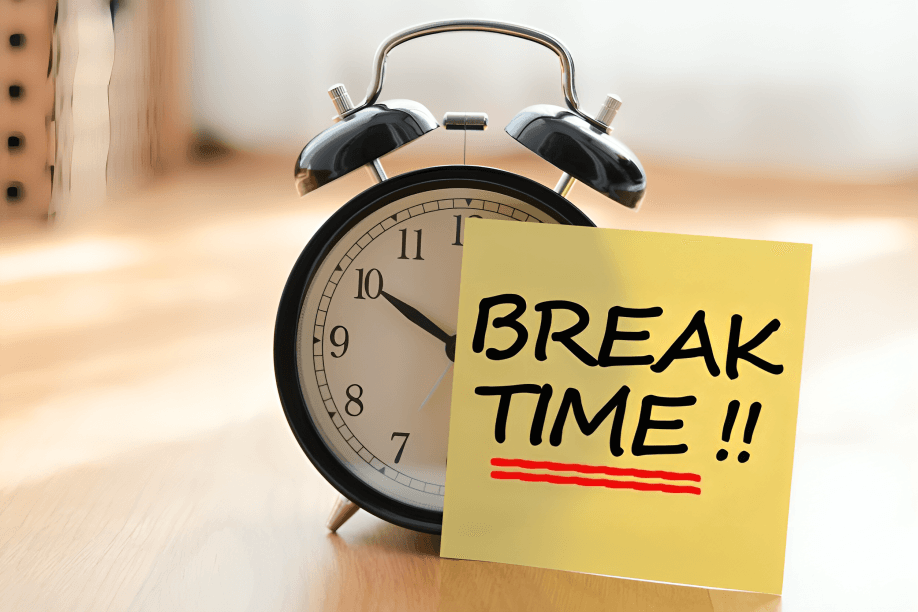
“
Understanding the importance of taking breaks during work hours is crucial in today’s fast-paced professional world. Regular breaks not only refresh the mind but also increase overall performance, productivity, and well-being. Whether it’s a short walk or a moment of stillness, stepping away from work tasks can reduce stress, prevent burnout, and sharpen concentration. 1
1
”
Continuous work without breaks can lead to decision fatigue, making employees more likely to make mistakes or poor judgments later in the day, especially during mentally demanding tasks. 1
Microbreaks, even lasting just 30 seconds to a minute, have been shown to reduce stress levels and improve concentration when taken periodically during long working hours. 2

Taking a break every 90 minutes aligns with our body’s ultradian rhythm, helping maintain high energy, sharper focus, and greater creative thinking throughout the workday.
Studies suggest that people who take regular breaks are more engaged with their tasks and experience higher overall job satisfaction compared to those who push through without stopping. 3
Working for long hours without breaks increases cortisol levels in the body, which contributes to chronic stress and eventually leads to burnout and reduced productivity. 4
Step-away breaks allow the brain’s “default mode network” to activate, a key neurological function that supports creative problem-solving and internal reflection. 5
Companies with a culture that encourages breaks see higher staff retention, fewer sick days, and a generally happier workforce, making break-friendly policies a strategic business choice. 6
The Pomodoro Technique promotes working for 25 minutes followed by a 5-minute break, reinforcing that structured pauses help the mind reset and prepare for the next focus session. 7
Brain scans show that short breaks allow overused neural circuits to rest, preserving mental clarity and reducing the likelihood of mistakes in repetitive or precision-based work. 8

Scheduled breaks can act as natural milestones, giving workers something to look forward to and helping them stay motivated throughout demanding or tedious tasks.
Taking a break can prevent decision fatigue during long meetings or planning sessions, ensuring that critical choices are made with a clear and alert mind. 9
Social interactions during break times, even brief ones, boost emotional well-being, strengthen team cohesion, and often lead to unexpected idea exchanges or collaboration sparks. 10
Breaks reduce the mental buildup of information overload, especially in jobs that require continuous online or screen time, giving the brain a chance to process and store knowledge. 11
Drinking water or having a light snack during breaks can improve energy levels and brain function, aiding concentration and reducing the afternoon productivity slump. 12
Silence or mindfulness during short breaks activates parts of the brain responsible for memory and empathy, proving that even doing “nothing” has positive neurological effects. 13

Workers who take proper lunch breaks report fewer headaches, lower stress levels, and better digestion than those who eat quickly at their desks without stepping away.
Research in Japan found that workers who took regular short breaks showed a 13% increase in productivity and reported feeling more refreshed and confident about their output. 14
Incorporating laughter or light humor into break time can elevate mood, reduce physical tension, and improve mental resilience when returning to high-pressure work environments. 15
Breaks are essential for sustaining motivation during long projects, preventing loss of focus, and recharging the willpower needed to complete complex or time-consuming assignments. 16
Confucius, the great Chinese philosopher, believed balance was key in all pursuits. Even at work, his teaching reminds us that rest is not withdrawal—it is strength restored.17


